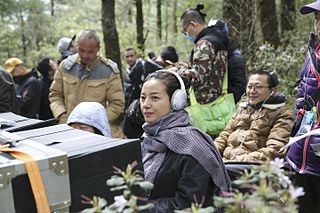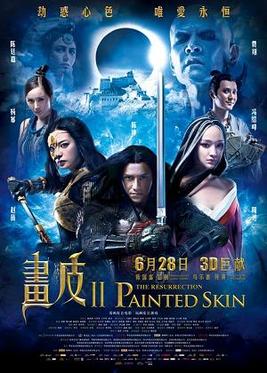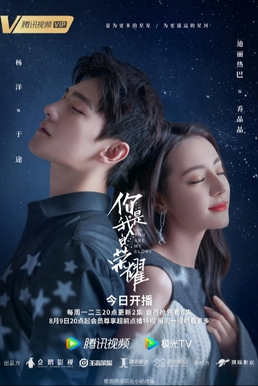
Zhao Wei, also known as Vicky Zhao or Vicki Zhao, is a Chinese actress, singer, filmmaker and businesswoman. She rose to pan-Asian fame for her role as Xiaoyanzi in the TV series My Fair Princess (1998–1999), followed by a series of popular films, such as Shaolin Soccer (2001), Red Cliff (2008–2009), Painted Skin (2008), Painted Skin: The Resurrection (2012), and Lost in Hong Kong (2015). She made her directorial debut with So Young (2013), which is a commercial and critical success. She is also a singer with 7 albums and the second largest shareholder of Alibaba Pictures, the film division of e-commerce giant Alibaba Group Holdings. Zhao ranked 80th on Forbes China Celebrity 100 list in 2013, 22nd in 2014, 7th in 2015, and 28th in 2017.

Liu Zhang, courtesy name Jiyu, was a Chinese politician and warlord who served as provincial governor who lived in the late Eastern Han dynasty of China. He became the Governor of Yi Province, succeeding his father Liu Yan and ruled the region until 214, when he surrendered to Liu Bei. Six years later, Liu Zhang again surrendered to Eastern Wu, and died shortly afterwards. Liu Zhang is often considered an incapable leader but is noted to have been the original lord of some of Shu Han's most famous generals and officials such as Fa Zheng, Meng Da, Zhang Ni, Liu Ba, Huang Quan, Wu Yi, Li Yan, Dong He and others.

My Fair Princess, also known as Return of the Pearl Princess or Princess Returning Pearl, is a 1998–1999 Chinese-Taiwanese period drama jointly produced by Yi Ren Communications Co. (怡人傳播公司) in Taiwan and Hunan Broadcasting System in China. Season 1 (1998) was filmed in 1997, and Season 2 (1999) in 1998–1999. Both seasons were filmed in Beijing, Chengde and the Bashang Plateau in China, and first shown on China Television in Taiwan.

Three Kingdoms: Resurrection of the Dragon is a 2008 Hong Kong action war film directed by Daniel Lee, who also writer with Lau Ho-leung. The film is loosely based on parts of the 14th-century Chinese classical novel Romance of the Three Kingdoms. The film was reported budget of US$25 million. The film is a joint production between Hong Kong, China and South Korea. The film stars Andy Lau, Sammo Hung, Maggie Q, Vanness Wu, Andy On, and Ti Lung. The film was released theatrically in Hong Kong on 3 April 2008.

Royal Tramp is a 2008 Chinese television series adapted from Louis Cha's novel The Deer and the Cauldron. Produced by Zhang Jizhong and Huayi Brothers, the series consists of 50 episodes, filmed in high definition. The series was first broadcast on Jiangsu TV in China in 2008 and was subsequently aired on TVB in Hong Kong and other countries.

The Water Margin is a 1998 Chinese television series adapted from Shi Nai'an's classical 14th-century novel of the same title. It was produced by CCTV with Zhang Jizhong as producer. It was first broadcast in China in January 1998. The series also featured action choreography by Yuen Woo-ping.

All Men Are Brothers is a 2011 Chinese television series adapted from Shi Nai'an's 14th century novel Water Margin, one of the Four Great Classical Novels of Chinese literature. The series is directed by Kuk Kwok-leung and features cast members from mainland China, Taiwan and Hong Kong. The series was first broadcast on 8TV in March 2011 in Malaysia.

This is a complete filmography of Chinese actress, director and producer Zhao Wei. In an acting career that spanned more than twenty years, Zhao performed on screen, television and stage. She is regarded by many as Mainland China's first "national idol" since the economic reform began in 1978. Zhao appeared in a range of genres, including comedies, period dramas, modern dramas, actions. Zhao was awarded the Hong Kong Film Award, Hong Kong Film Critics Society Award, Golden Rooster Award, Hundred Flowers Award, Shanghai Film Critics Award, Huabiao Award, Golden Eagle TV Award, and as well as the Shanghai Film Festival Golden Globet.

1911 Revolution is a Chinese television series based on the events of the Xinhai Revolution, which brought an end to imperial rule in China in 1911. It was first broadcast on CCTV-1 during prime time on 27 September 2011. It was specially produced to mark the 100th anniversary of the Xinhai Revolution.

Painted Skin: The Resurrection is a 2012 Chinese fantasy action film directed by Wuershan, starring Zhou Xun, Chen Kun, Zhao Wei, Feng Shaofeng and Yang Mi. The film reunites most of the original cast of the 2008 film Painted Skin., acting as a sequel to the original film in a new storyline and characters with some degrees of connection.

Scarlet Heart 2 is a 2014 Chinese television series. It is the sequel to Scarlet Heart (2011), and continues the story after the time traveling protagonist, Zhang Xiao, returns to her own time following the death of Ma'ertai Ruoxi. The story is not considered to be canon to Tong Hua's novel Bu Bu Jing Xin because the author never wrote a sequel, although some of the cast members from the first series have returned. Unlike its predecessor, the series does not involve time traveling and is set in the present, resolving the loose ends left by the first series' cliffhanger.
Yang Zishan is a Chinese actress. She is known for her breakout role in the film So Young, which won her the Huabiao Award for Outstanding New Actress and the Best Actress awards at the 5th China Image Film Festival and the 5th International Chinese Film Festival. Her outstanding performance in So Young also earned her nominations for best actress for the Golden Rooster Award, the Hundred Flowers Award, and at the Asia-Pacific Film Festival. In 2015, she won the Best Actress Award at the Shanghai International Film Festival for her performance in 20 Once Again. In 2017, She starred in Walking Past the Future, the only Chinese film to be nominated for the Un Certain Regard at the 2017 Cannes Film Festival, and the science fiction thriller Battle of Memories. In 2018, she starred in Till the End of the World, the first film in history to shoot in Antarctica. In 2020, her film Wuhai premiered at the 68th San Sebastian Film Festival where it competed for the Golden Shell. In 2021, her film Ripples of Life premiered at the 2021 Cannes Film Festival. In 2023, Yang Zishan was appointed the Jury Member of the 25th Shanghai International Film Festival Golden Goblet Award. In 2024, Yang Zishan was appointed the International Jury Member to the 14th Beijing International Film Festival.
Wang Sen is a Chinese actor. Since 2013, he has signed to Zhao Wei's Agency.

So Young 2: Never Gone, commonly known as Never Gone, is a 2016 Chinese romantic drama film based on the popular novel by Xin Yiwu. The film is directed by Zhou Tuoru, produced by Zhang Yibai and stars Kris Wu and Liu Yifei. Though the stories are unrelated, the film was promoted as the sequel to 2013 youth romance film So Young, and released in China on 8 July 2016.

Love, Timeless is a 2017 Taiwanese television series created and produced by Eastern Television. Starring Nick Chou, Summer Meng, Huang Wei Ting and Chang Chieh as the main cast. Filming began on February 24, 2017 and wrapped up on June 17, 2017. First original broadcast on TTV every Saturday at 10:00 pm starting April 15, 2017.

Chinese Restaurant is a Chinese celebrity reality show broadcast by Hunan Television. The show features five celebrities as they run a chinese restaurant abroad in 20 days with the aim to promote Chinese Food culture. It's Vicky Zhao's first reality show as a regular guest.
Decisive Engagement: The Liaoxi-Shenyang Campaign is a 1991 Chinese epic war film directed by Li Jun, Yang Guangyuan, Wei Lian, Cai Jiwei, Zhao Jilie, Zhai Junjie and Jing Mukui, written by Li Pingfen, Shi Chao and Wang Jun, and starring Gu Yue, Su Lin, Ma Shaoxin, Lu Jixian, Zhao Hengduo, and Wu Zhiyuan. The film premiered in China on January 1, 1992. The film is about the Liaoshen Campaign of the Chinese Civil War.

Singing When We're Young is a 2013 Chinese youth film, produced by Andy Lau, is the director's debut of Liu Juan. The film was shortlisted in the "Asian Newcomer Award" unit of the 16th Shanghai International Film Festival, and won a special jury award. Released in China on July 4, 2013.

You Are My Glory is a 2021 Chinese television series starring Yang Yang and Dilraba Dilmurat. Based on the novel of the same name written by Gu Man, it mainly tells the story of the popular actress Qiao Jingjing and her former high school classmate Yu Tu as they unexpectedly reunite to play the mobile game Honor of Kings. It premiered on Tencent Video and WeTV on July 26, 2021 and ran until August 30, 2021.
















